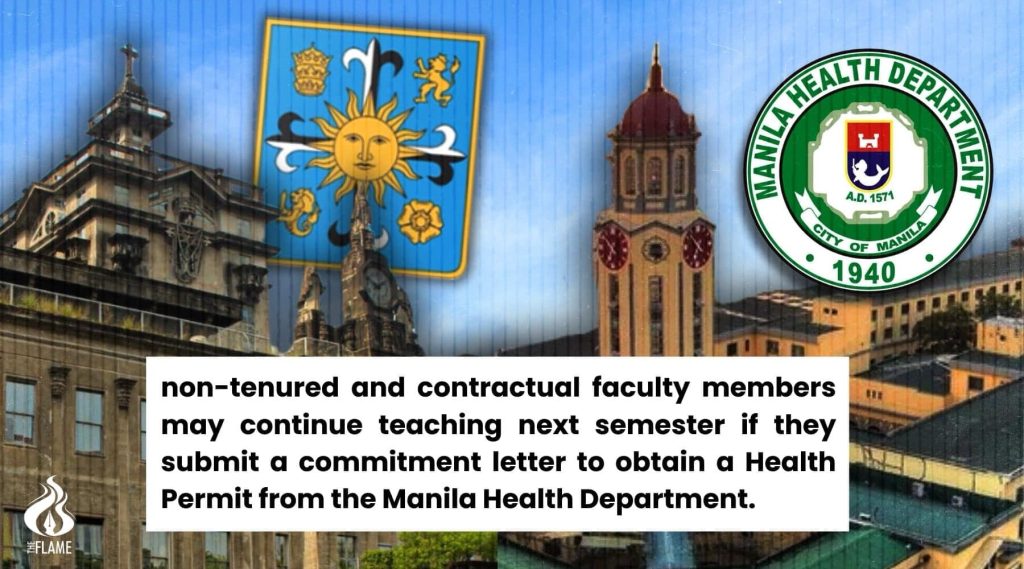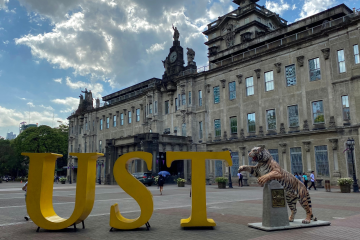
THE UST administration would allow non-tenured faculty members who did not follow the health permit policy to teach next term if they submit a letter committing to secure a health permit from the Manila Health Department, a coalition of the University’s labor unions said.
In a report containing the key points of its initial dialogue with University officials, the Organisasyon ng Nagkakaisang Empleyado-UST (ONE-UST) said part-time personnel should receive equal treatment as regular employees who were given teaching loads for the first term.
“The UST administration asserts that non-tenured and contractual faculty members may continue teaching next semester if they submit a commitment letter to obtain a health permit from the Manila Health Department. It insists that submitting a health permit is necessary for UST to achieve full compliance with the sanitary permit requirements,” the report dated Aug. 26 read.
“We propose that non-tenured faculty be treated the same as other UST employees regarding this requirement, and that part-time employees should be allowed to use a health clearance from their principal employer as sufficient compliance,” it added.
The meeting was attended by the leaders of ONE-UST, Vice Rector for Academic Affairs Prof. Cheryl Peralta, Secretary General Fr. Louie Coronel, O.P, UST Hospital Director Prof. Charito Malong and UST Human Resource Director Asst. Prof. Maureen Gelle-Jimenez.
Under Ordinance 8793, or the Sanitation and Disinfection Code of Manila issued in 2021, employees are mandated to submit stool and urine samples and undergo a chest x-ray and drug test worth P625 exclusively at the public health laboratory of the Manila Health Department, which is led by Arnold “Poks” Pangan, husband of Manila Mayor Honey Lacuna.
A number of non-tenured instructors who did not comply with the policy have been barred from teaching during the first term of the academic year.
The ordinance has drawn widespread criticism from workers and students who believe that the policy poses excessive burden and lacks fairness. Labor groups have also warned that the policy would disrupt the smooth operations of UST.
According to the ONE-UST report, the University administration maintained that getting a health permit is “necessary” for UST to meet the requirements of the sanitary permit. However, ONE-UST argued that the health permit differs from the sanitary permit, as clarified by Memorandum 608 issued by Pangan.
“Therefore, the teaching loads of non-tenured faculty members who lost them due to non-submission of the health permit should be reinstated,” the coalition said.
During the dialogue, ONE-UST said Peralta had clarified that complying with the sanitary permit is a “key component” in the University’s autonomous status and recognition from accrediting agencies. The administration’s supposed lack of transparency regarding the permit’s implications created “unnecessary complications,” the group said.
“While we acknowledge UST’s recent clarification on the need for this permit, particularly for its impact on the university’s application for autonomous status and CHED (Commission on Higher Education) recognitions, the lack of prior consultation and transparency created unnecessary complications,” the coalition said.
Deadline imposed by UST?
The health permit policy was first relayed to all UST personnel in April through a memorandum issued by the Office of the Vice Rector for Finance. The office gave employees until May 31 to comply. But due to several calls for leniency from labor groups, Lacuna agreed to move the deadline to July 31.
According to the report, ONE-UST was told that the health permit deadline was not set by the Manila Health Department but by UST to “expedite” the sanitary permit process.
“While we understand the intention behind this approach, we believe that greater transparency would help avoid any misunderstandings. It’s important that employees feel fully informed and assured that their efforts align with the actual requirements for obtaining the sanitary permit,” the coalition said.
ONE-UST added that the directive provided in the frequently asked questions document bearing the seals of UST, Lungsod ng Maynila, and the Manila Health Department has caused confusion and frustration due to its “illogical inconsistencies.” The document contains a warning to employees that they would be locked out of the University’s official online service should they fail or refuse to obtain a health certificate within the deadline, a sanction that labor leaders have criticized.
The labor group also called on UST to adhere to the provisions of its existing collective bargaining agreement on medical benefits that would ensure “worker consultation and principled cooperation.”
“While some colleagues demand accountability for those responsible for flawed policies, ONE-UST emphasizes the importance of moving forward,” the coalition added.
According to ONE-UST, the University administration would benchmark how other institutions comply with the ordinance, noting that some schools have not yet followed the policy or are still negotiating with the Manila Health Department.
The employees’ group said UST Rector Fr. Richard Ang, O.P. has expressed commitment to hold a dialogue after his installation rites on Sept. 9.
“We believe his leadership is essential for resolving the health permit issue and rebuilding trust within the Thomasian community,” ONE-UST said. F — Mei Lin Weng



